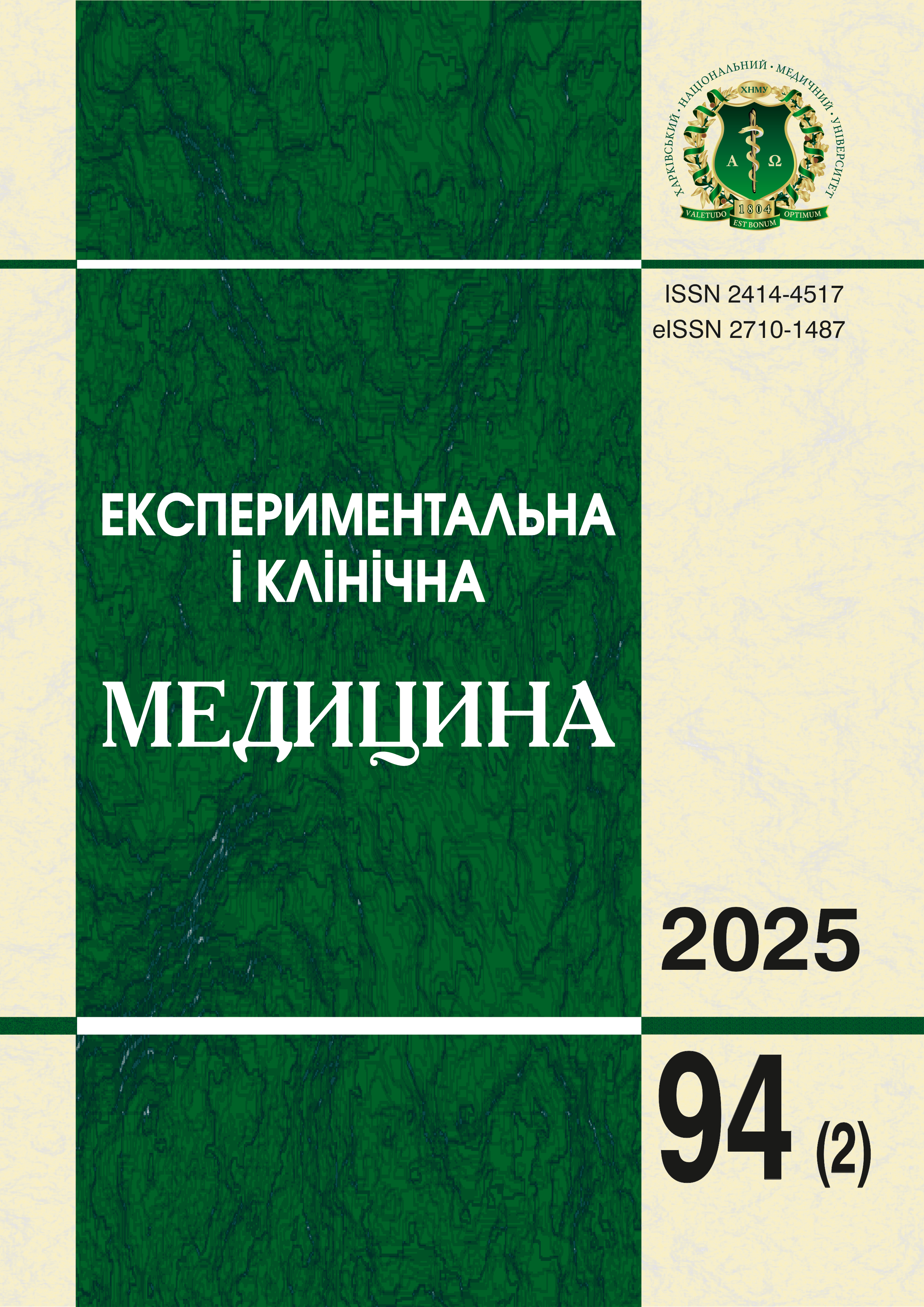Анотація
In press
Синдром Емоційного Вигорання (СЕВ) є серйозною проблемою, що впливає на психічне здоров’я та професійну ефективність медичних працівників, особливо в умовах війни, соціальної нестабільності й реформ охорони здоров’я. Найвразливішими є медичні сестри. Метою дослідження стало виявлення та ранжування ключових ендогенних (психофізіологічних) і екзогенних (організаційно-соціальних) факторів ризику СЕВ. Опитано 206 фахівців різних спеціальностей за допомогою анкети, що охоплювала психоемоційний стан, фізичне самопочуття, соціальну підтримку, професійне навантаження та стосунки в колективі. Для аналізу даних використовували описову статистику, кореляційний і однофакторний дисперсійний аналіз (ANOVA, ANalysis Of Variance). Встановлено, що основними предикторами СЕВ є поєднання виснаження, хронічної втоми, надмірного навантаження, конфліктів із керівництвом, слабкої соціальної підтримки та низької стресостійкості. Результати можуть бути використані для розробки профілактичних програм.
Ключові слова: психоемоційне навантаження, стресостійкість, анкетування.
Посилання
Rusanov V. Professional burnout of medical workers in wartime conditions: historical analysis, current research, and author's definition. PMGP [Internet]. 2024;9(3). Available at: https://grobid.e-medjournal.com/index.php/psp/article/view/529
Zasiekina L, Martyniuk A. War-related continuous traumatic stress as a potential mediator of associations between moral distress and professional quality of life in nurses: a cross-sectional study in Ukraine. BMC Nurs. 2025;24:16. DOI: 10.1186/s12912-024-02668-4. PMID: 39762818.
World Health Organization. Mental health and psychosocial well-being among health workers during COVID-19 and conflict. Geneva: WHO; 2023. Available at: https://www.who.int/publications/i/item/9789240070122
Maslach C, Leiter MP. Understanding the burnout experience: recent research and its implications for psychiatry. World Psychiatry. 2016;15(2):103-11. DOI: 10.1002/wps.20311. PMID: 27265691.
Salvagioni DAJ, Melanda FN, Mesas AE, González AD, Gabani FL, Andrade SM. Physical, psychological and occupational consequences of job burnout: A systematic review of prospective studies. PLoS One. 2017;12(10):e0185781. doi: 10.1371/journal.pone.0185781. PMID: 28977041.
Botiakova VV. Prevalence of burnout syndrome among medical professionals in Ukraine from 2018 to 2022: a literature review. Art of Medicine. 2023;1(25): 92-100. DOI: 10.21802/artm.2023.1.25.92.
Harbuzova V, Ulunova A, Mynenko S. Assessment of professional life quality and resilience of medical staff working at military treatment and rehabilitation facilities in the conditions of war in Ukraine. Eastern Ukrainian Medical Journal. 2024;12(3):492-504. DOI: 10.21272/eumj.2024;12(3):492-504
Maslach C, Jackson SE. The measurement of experienced burnout. J Organ Behav. 1981;2(2):99-113. DOI: 10.1002/job.4030020205.
Ware JE Jr, Sherbourne CD. The MOS 36-item short-form health survey (SF-36). I. Conceptual framework and item selection. Med Care. 1992;30(6):473-83. DOI: 10.1097/00005650-199206000-00002. PMID: 1593914.
Maslach C, Jackson SE, Leiter MP. Maslach Burnout Inventory Manual. 3rd ed. Palo Alto, CA: Consulting Psychologists Press; 1996. 66 р. Available at: https://www.mindgarden.com/maslach-burnout-inventory/120-mbi-manual.html
Cohen S, Kamarck T, Mermelstein R. A global measure of perceived stress. Journal of Health and Social Behavior. 1983;24(4):385-96. DOI: 10.2307/2136404. PMID: 6668417.
Sherbourne CD, Stewart AL. The MOS social support survey. Soc Sci Med. 1991;32(6):705-14. DOI: 10.1016/0277-9536(91)90150-B. PMID: 2035047.
Eisenberger R, Huntington R, Hutchison S, Sowa D. Perceived organizational support. J Appl Psychol. 1986;71(3):500-7. DOI: 10.1037/0021-9010.71.3.500.
World Health Organization. Protecting health and care workers' mental health and well-being: Technical Consultation Meeting. 25 April 2024. Available at: https://www.who.int/news/item/25-04-2024-202404_protecthw_mentalhealth
Halbesleben JRB. Sources of social support and burnout: A meta-analytic test of the conservation of resources model. Journal of Applied Psychology. 2006;91(5):1134-45. DOI: 10.1037/0021-9010.91.5.1134. PMID: 16953774.
Shanafelt TD, Boone S, Tan L, Dyrbye LN, Sotile W, Satele D, et al. Burnout and satisfaction with work-life balance among US physicians relative to the general US population. Archives of Internal Medicine. 2012;172(18):1377-85. DOI: 10.1001/archinternmed.2012.3199. PMID: 22911330.
Dyrbye LN, Shanafelt TD. Physician burnout: a potential threat to successful health care reform. JAMA. 2011;305(19):2009-10. DOI: 10.1001/jama.2011.652. PMID: 21586718.
Grossi G, Perski A, Evengård B, Blomkvist V. Physiological correlates of burnout among women. J Psychosom Res. 2003;55(4):309-16. DOI: 10.1016/S0022-3999(02)00628-6. PMID: 14507541.
Skevington SM, Lotfy M, O'Connell KA; WHOQOL Group. The World Health Organization's WHOQOL-BREF quality of life assessment: Psychometric properties and results of the international field trial. Qual Life Res. 2004;13(2):299-310. DOI: 10.1023/B:QURE.0000018486.91360.00. PMID: 15085902.
EuroQol Group. EuroQol-a new facility for the measurement of health-related quality of life. Health Policy. 1990;16(3):199-208. DOI: 10.1016/0168-8510(90)90421-9. PMID: 10109801.
World Health Organization. Mental health in the workplace: Information sheet. 2023. Available at: https://www.who.int/publications/i/item/WHO-MSD-MER-2023.1
Sanchez-Moreno E, Roldan I, Gallardo-Peralta L, de Roda AB. Burnout, informal social support and psychological distress among primary care nurses. J Clin Nurs. 2014;23(17-18):2445-52. DOI: 10.1111/jocn.12571. PMID: 25280135.
Duarte I, Teixeira A, Castro L, Marina S, Ribeiro C, Jacome C, et al. Burnout among Portuguese healthcare workers during the COVID-19 pandemic. BMC Public Health. 2020;20(1):1885. DOI: 10.1186/s12889-020-09980-z. PMID: 33287794.
West CP, Dyrbye LN, Shanafelt TD. Physician burnout: contributors, consequences and solutions. Journal of Internal Medicine. 2018;283(6):516-29. DOI: 10.1111/joim.12752. PMID: 29505159.
Mealer M, Jones J, Newman J, McFann KK, Rothbaum B, Moss M. The presence of resilience is associated with a healthier psychological profile in intensive care unit (ICU) nurses: results of a national survey. International Journal of Nursing Studies. 2012;49(3):292-9. DOI: 10.1016/j.ijnurstu.2011.09.015. PMID: 21974793.
Hall LH, Johnson J, Watt I, Tsipa A, O'Connor DB. Healthcare staff wellbeing, burnout, and patient safety: A systematic review. PLoS One. 2016;11(7):e0159015. DOI: 10.1371/journal.pone.0159015. PMID: 27391946.

Ця робота ліцензується відповідно до Creative Commons Attribution-NonCommercial-ShareAlike 4.0 International License.

